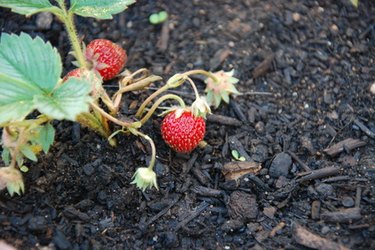Things You'll Need
Compost activators
Pitchfork
Drum or tumbler compost system (optional)
Green composting materials
Brown composting materials
Kitchen scraps
Yard wastes

There are numerous benefits to making and using compost, also known as "black gold." It supplies essential nutrients to your plants and enriches your soil, turning it into a lush growing compound. It recycles kitchen scraps and household and yard wastes, keeping them out of landfills. Compost also introduces microorganisms that aerate the soil and break down organic substances. Unlike synthetic fertilizers, it doesn't leave behind potentially harmful residues. The decomposition that turns your scraps into usable compost can take up to a year, but there are several ways to accelerate the process. By providing ideal conditions for the beneficial organisms responsible for the decomposition process, the process lessens to only a month or two.
Step 1
Add compost activators such as grass clippings, fresh manure, rich compost from a finished pile and earthworms or "red wigglers" to your compost.
Video of the Day
Step 2
Make sure that your compost pile is the appropriate size, about 3-feet wide, 3-feet deep and 4-feet tall. This size ensures that the pile will generate the right amount of heat, which is essential in the decomposition process.
Step 3
Keep the moisture levels in your pile correct. It should always be slightly moist like a wrung out sponge, not too wet and never completely dry. If the pile becomes either too wet or too dry, it will inhibit the decomposition process.
Step 4
Turn the pile about every other week with a pitchfork to ensure it gets the appropriate amount of oxygen. The beneficial organisms that are responsible for breaking down the substances in your compost pile need oxygen to survive. This is one reason that the drum or tumbler systems are so effective, which is the fastest method of producing compost.
Step 5
Layer your compost pile with equal parts of both green and brown materials. Green materials are those that are high in nitrogen, such as vegetable peelings, fresh manure, coffee grounds, grass clippings and other plants cuttings. Brown materials are those that are high in carbon, such as brown leaves, hay or straw, paper, eggshells, tea bags, saw dust and wood ashes.
Step 6
Cut kitchen scraps into small pieces and shred twigs and leaves or run them over with a lawn mower before adding them to your compost. Smaller pieces will break down faster than larger ones.
Tip
Never add meat, bones, grease or other fats to your compost pile. These do not break down easily, will turn your pile rancid and encourage unwanted pests.
Never add any glass, plastic or metal to your compost pile. These will not break down at all, and can be dangerous within a compost pile.
Do not add any diseased plants or weeds that are full of seeds.
Only add wood ash or sawdust in small amounts, as they inhibit decomposition in large amounts.
Video of the Day